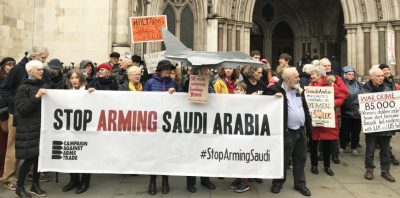UK Renewal of Arms Sales to Saudi Arabia to Face Another Legal Challenge
Campaign Against Arms Trade to launch judicial review after UK government claimed international law violations in Yemen were 'isolated incidents'

The UK government’s decision to resume selling arms to Saudi Arabia, following a one-year pause, is set to face another legal challenge.
Campaign Against Arms Trade (CAAT) announced on Tuesday that it had launched a judicial review application into the UK’s decision to renew selling arms to the Saudi-led coalition involved in Yemen.
In June 2019, all new British arms sales to Saudi Arabia, the United Arab Emirates, Egypt, Bahrain and Kuwait were suspended after a lengthy legal battle. The Court of Appeal ruled that the UK government had failed to make an assessment of whether there was a risk that the weapons could be used to breach international humanitarian law in Yemen.
Britain has since resumed arms sales to the coalition, after International Trade Secretary Liz Truss told MPs in July that there were no patterns or trends of violations of international law by Saudi forces in Yemen, and any breaches were “isolated incidents”.
CAAT has accused the government of providing little information on how it came to this conclusion and of prologing the conflict through arms sales.
“Tens of thousands of people have been killed in this brutal bombardment, yet arms companies have profited every step of the way,” Andrew Smith, a spokesperson from Campaign Against Arms Trade, said.
“Last year the Court of Appeal found that the government had acted illegally, and nothing that we have seen since suggests otherwise.
“The government may think that the widespread destruction of schools, hospitals and homes can be dismissed as ‘isolated incidents’ but we do not. These arms sales are immoral, and we are confident that the court will confirm that the decision to renew them was illegal.”
Saudi Arabia and its allies intervened in Yemen’s civil war in March 2015, and have since carried out more than 20,000 air strikes in an effort to roll back the Houthi rebels, who seized the capital Sanaa in late 2014. One-third of those strikes have been on non-military sites, including schools, factories and hospitals, according to the Yemen Data Project.
Rosa Curling, from the law firm Leigh Day, which represents CAAT, said that every international body that had investigated violations of international human rights law by Saudi Arabia in Yemen had found repeated violations.
“Despite this, our government has determined it appropriate to continue to arm the coalition, a decision which our client considers unlawful and a decision we hope the court will overturn as a matter of priority,” Curling said.
In August, a British soldier born in Yemen was arrested after he publicly protested against UK arms sales to Saudi Arabia.
Ahmed al-Batati, a 21-year-old lance corporal from Sheffield, stood outside Whitehall in his military uniform, and reportedly blew a whistle every 10 minutes for nine and a half hours to symbolically mark how often a child dies in Yemen.
“We are soldiers that serve the government, so why should I continue my service to a government that continues to prioritise money over the victims of Yemen,” Batati told MEE at the time. “My message is clear: I refuse to serve them until they make the right decisions to end the unlawful arms trade with Saudi Arabia.”
New figures released by the UK government just this month revealed that Saudi Arabia was by far the world’s biggest defence spender over the past decade, having purchased $116bn in arms – twice as much as any other country.
*
Note to readers: please click the share buttons above or below. Forward this article to your email lists. Crosspost on your blog site, internet forums. etc.

